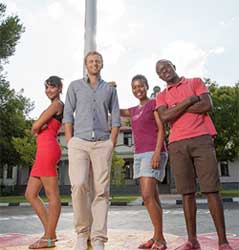Higher Education and Training Minister Blade Nzimande has released a new policy framework, which aims to end racism and promote integration at tertiary institutions.

Higher Education Minister Blade Nzimande has published a policy framework that will see greater integration in South African tertiary institutions where, he says, racial divides remain high. Image: GCIS
The policy, which will be known as the Policy Framework for Social Inclusion in the Post-School Education and Training System, will serve as a guide for institutions to address issues such as race, class, disability, gender, HIV and Aids, age, demographics and citizenship, among others.
"The main intention of the policy is to ensure that educational institutions recognise and promote integration, a culture of human rights, unity in diversity as well as human dignity and thus eradicate all forms of discrimination," Nzimande said.
Once approved, the policy will be introduced in all the country's tertiary institutions, technical and vocational education and training colleges, sector education and training authorities and adult education and training centres.
The policy will see the implementation of anti-racism and citizenship curricular, as well as extra-curricular education programmes. A mandatory subject on citizenship and values will allow student leaders to be trained.
Nzimande said the policy will introduce culturally-mixed student residences that will reflect the demographics of the country.
Exclusionary policies
According to Nzimande there have been reports from some institutions that implement policies to exclude students from specific racial groups and these exclusionary practices will be stopped as there is no room for ethnicity and racism in post-schooling institutions.
"The struggle for transformation has a long way to go, hence we are calling for social mobilisation," he said, adding that government alone cannot achieve this without the cooperation of South Africans and relevant civil society organisations.

South Africa needs to do more to integrate people from different backgrounds, races and economic conditions at tertiary institutions. Image:
Slate"The closing of physical, social and economic distances separating South Africans is essential in order to achieve social cohesion," he said.
On the issue of HIV and Aids, the draft policy calls for institutions to create awareness of these conditions by disseminating information through curricula, while ensuring that people living with HIV and Aids are not stigmatised and that institutions are linked to accredited sites that offer support for people living with HIV.
In addition, it advocates for the establishment of wellness centres within the institutions, which will be adequately funded and employ fully qualified staff. The department hopes to achieve this by working closely with the Department of Health.
Clear, non-discriminatory regulations
The draft policy calls on institutions to develop clear regulations to handle all cases of gender based violence, including raising awareness about the rights of lesbians, gays, bisexual, transgender and intersex persons and recommends that staff members and security personnel receive training on how to deal with these cases.
Referring to people with disabilities, Nzimande said the department will address issues such as accessible accommodation, transportation as well as curriculum adaptation and staff development in order to deal with people with disabilities.
According to the draft policy, students from disadvantaged backgrounds will receive targeted funding from the National Skills Fund. It will also ensure that quality higher education and training is available in all parts of the country, including rural and peri-urban areas, while addressing the issue of hunger on campuses.
"This policy is based on experiences of South Africans and aims to cut across group identities in empowering citizens for a constructive role in the development of the country, in line with the National Development Plan," he added.






























